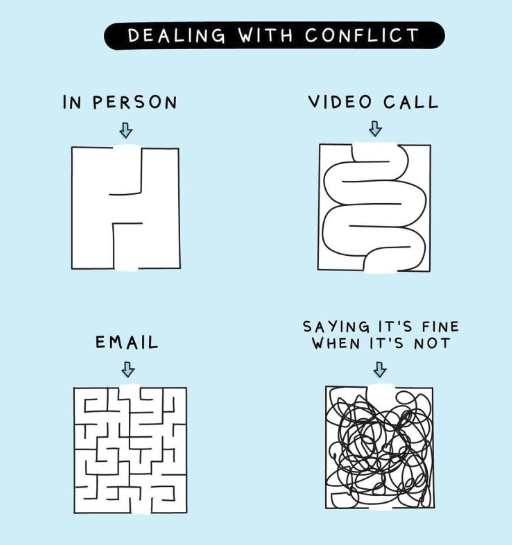
The other day, a colleague sent me a text.
The message said, “I saw this on LinkedIn and thought of you”, and below the text, he had simply pasted this image.

I replied with a smiley emoji.
The ellipsis symbol popped up with the three flashing dots. He was typing a new message.
“I think we’re dealing with a case of the scenario on the bottom right”.
My colleague is a partner in a VC firm, and he had recently asked us to step in and mediate between two founders in one of their portfolio companies. Whilst at some points during the mediation things had become a bit heated, in the end both parties had come to an agreement. All in all, it seemed like a successful process with a positive outcome being reached.
“They’re back to their old ways. What do you think we should do?”
We are often asked what proof exists that a mediation was actually successful, even after a supposedly mutually beneficial agreement has been reached.
Mediation is a process where parties come together, facilitated by a neutral mediator, to craft mutually acceptable solutions to their disputes. But what happens after the ink dries on the agreement? Does the resolution stand the test of time? What happens if old conflicts resurface? What evidence is there that what was ‘agreed’ is actually followed through or carried out?
What are the realities and challenges of implementing agreements and navigating life after conflict resolution?
At the heart of every successful mediation lies an agreement – a roadmap forged through dialogue and understanding. This document encapsulates the collective aspirations of the parties involved, outlining their commitments, responsibilities, and the path forward. Yet its mere existence does not guarantee a smooth journey ahead. The true test lies in the execution.
Determining the success of a mediation can be multi-faceted and depends on various factors, including the goals of the parties involved and the nature of the dispute.
The first step following any mediation is ownership. Both parties must internalise their roles and responsibilities outlined in the agreement. It’s not merely a legal document. It’s a pact built on trust and goodwill. However, as in the case of our two founders, saying everything’s find when it clearly isn’t, ultimately does not help define an agreement. As such, each party must hold themselves accountable for upholding their end of the bargain. Without this sense of ownership, the agreement risks becoming a hollow promise, destined to crumble at the slightest challenge.
While some feel that it goes without saying that the parties involved in a mediation should bear the primary responsibility for compliance, effective monitoring mechanisms are essential to ensure accountability. This could involve periodic check-ins (as my colleague had clearly been doing), progress reports, or the appointment of a neutral third party (such as the mediator) to oversee implementation. This ensures accountability and provides additional assurance that the terms of the agreement are being followed.
In the event of non-compliance or further disputes arising regarding the interpretation of the terms of the agreement, additional mechanisms for dispute resolution outlined in the agreement itself or agreed by the parties during mediation can be utilised. This may involve further mediation, arbitration, or other alternative dispute resolution methods.
Life post-mediation is not without its challenges. Despite the best intentions, unforeseen circumstances, changing dynamics, or lingering resentment may threaten the stability of the agreement.
Moreover, deep-rooted animosities or unresolved issues may resurface, testing the resilience of the newfound (albeit short-lived) peace.
Effective communication serves as a lifeline in navigating post-mediation challenges. The parties need to foster a culture of transparency and collaboration. Honest discussions about setbacks, concerns or evolving needs are essential for adapting and finding workable solutions.
Flexibility is equally crucial. Rigidity breeds conflict, while adaptability helps to pave the way for sustainable resolutions.
Though the mediator’s direct involvement typically ends at the conclusion of the mediation process, their impact reverberates in the journey ahead. Some mediators offer post-mediation support, providing guidance, or facilitating follow-up sessions to address implementation challenges.
While their role may evolve, their impartial guidance and expertise continue to inform and empower parties in navigating post-mediation complexities.
Mistakes happen, agreements falter, but it’s how parties learn and adapt that defines their resilience. While agreements provide a framework for resolution, their true value lies in the commitment, communication, and collaboration or the parties involved. By taking ownership, fostering accountability, and navigating challenges with resilience, the parties can successfully chart a course towards shared responsibility.
Our process is designed to empower you to address your challenges by facilitating discussion, exploring the conflict in depth from other perspectives, and seeking to reach a personalised solution that has considered various outcomes and consequences.
ABN: 79 669 530 321